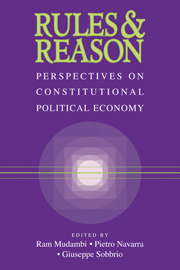1 - Constitutional Issues in Modern Democracies
Published online by Cambridge University Press: 05 June 2012
Summary
Constitutional political economy is an intellectual endeavor in which the notions of efficiency and justice are necessarily balanced. Justice should emerge naturally from a constitutional process, whereas efficiency must be achieved through conscious effort. All the key issues in constitutional political economy relate directly or indirectly to one of these two notions and most to the interplay between the two. Fundamentally, we are concerned with the development of formal “rules” within informal structures in order to regulate all human actions.
Considerations of efficiency are in the realm of positive economics, that is, the analysis of questions of “what is.” Notions of justice, however, fall within the purview of normative economics, that is, the examination of questions of “what should be.” Constitutional political economy concerns the legal foundations of the market. The legal infrastructure is operationalized through a set of rules and regulations that can be thought of as signals indicating the domains of choice. It follows that these rules influence outcomes – a concern of positive economics. Further, some outcomes are “better” than others, which introduces issues related to comparisons of different sets of rules – a normative consideration.
Public choice is concerned with the development of a rigorous axiomatic general theory of government. In this view, politics is understood as a marketplace for individual exchanges. Within this marketplace, rules and regulations function as constraints on individual and collective action. These rules are implemented according to the institutional framework of the nation-state.
- Type
- Chapter
- Information
- Rules and ReasonPerspectives on Constitutional Political Economy, pp. 1 - 6Publisher: Cambridge University PressPrint publication year: 2001
- 2
- Cited by



